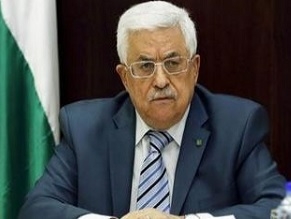|
World Jewish News

Palestinian Authority President Mahmoud Abbas at a PLO meeting in Ramallah, October 2, 2013. Photo: REUTERS/Mohamad Torokman
|
Abbas: I'll meet Netanyahu anytime to push forward peace
23.10.2013, Israel Palestinian Authority Chairman Mahmoud Abbas told a German newspaper on Wednesday that he was willing to meet with Prime Minister Binyamin Netanyahu at any time in order to advance the peace process.
Abbas told the Rheinische Post that there was no considerable progress made in the US-mediated negotiations partly due to the fact that both sides essentially began from scratch at the insistence of Netanyahu.
The Palestinian leader told the German daily that both sides were facing their last chance to clinch a peace agreement.
Netanyahu arrived in Rome on Tuesday, where he will meet with US Secretary of State John Kerry. The two men will also discuss the Israeli-Palestinian peace process.
The Israeli premier is also expected to urge Italy and the US to continue to impose sanctions against Iran as the best path to peacefully disarm Tehran’s nuclear weapons program.
“We must ensure that Iran won’t have nuclear weapons capabilities and that this can be achieved peacefully,” Netanyahu told his Italian counterpart Enrico Letta during a Tuesday night meeting in Rome.
Abbas traveled in Europe as well to urge its leaders to pressure Israel to halt West Bank settlement activity. On Tuesday, he visited Lithuania.
Israel has insisted that it will continue to build in the West Bank settlements. But separately, as a gesture to Abbas, it is preparing to release a second group of Palestinian prisoners who have been held in Israeli jails for terror activity since before the approval of the 1993 Oslo Accords.
To support the peace process Qatar agreed on Monday to give $150 million in debt relief to the Palestinian Authority as the pace of direct negotiations between Israel and the Palestinians intensified.
Since direct talk resumed in July, Israelis and Palestinians have held 13 serious meetings, three of which occurred over the last four days, Kerry told reporters at a joint press conference in Paris with Qatari Foreign Minister Khalid al-Atiyah.
“The pace [of the talks] has intensified. All the core issues are on the table, and they [the Israelis and Palestinians] have been meeting with increased intensity,” Kerry said.
Economic support is an important part of the peace process, Kerry told reporters in Paris, as he expressed confidence that other Arab countries would follow Qatar’s example.
But, he cautioned, a finalstatus agreement for a twostate solution is dependent on the ability of the two parties to make “key decisions” and “reasonable compromises.”
“That includes taking all of the steps that are necessary to create a positive atmosphere for the negotiations,” Kerry said.
He chided both the Israelis and the Palestinians and reminded them that a conducive atmosphere was one of the key things they had agreed to abide by for the duration of the nine-month peace process.
Kerry’s remarks come at a time when, in spite of the continuation of the talks, Palestinians and Israelis have both acted in ways that antagonized the other and have continued to exchange harsh words in public.
At the press conference, however, Kerry accentuated the positive. He said he was pleased with the Id al-Adha wishes that Netanyahu issued in advance of the Palestinian holiday.
Netanyahu has clarified that Israel is committed to maintaining the status quo in holy places, Kerry said.
“He [Netanyahu] made it clear that the hand of Israel is extended to the Palestinian people in hopes of peace,” Kerry said.
Kerry commended the Arab League and its offer through the Arab Peace Initiative to normalize relations between Israel and 57 nations, of which 35 are Muslim and 22 Arab. He thanked the Palestinian Authority as well as Abbas for their support of the peace process.
The Israeli and Palestinian leaders have displayed courage in entering and remaining in the peace process, Kerry said. They understand what is at stake, and they have taken risks in order to bring both parties to the table, he stated.
A two-state solution that offers a just and lasting peace is achievable, Kerry said, and added that the opportunity for peace was just over the horizon.
“Two proud peoples deserve the opportunity to realize their legitimate aspirations, their security, and their freedom, and their future,” Kerry said.
Atiyah told reporters that a two-state solution would be based on the pre-1967 borders.
He added that the division that exists between Gaza and the West Bank does not help the peace process. A way has to be found to open the crossing points in and out of Gaza, Atiyah said.
“Isolating Gaza won’t help the peace process,” he said.
Atiyah said he was concerned by Israel’s statements that harm the peace process as well as its actions, such as settlement expansion and the destruction of Palestinian homes and Beduin communities.
Also, raising the Israeli flag, we consider this to be a transgression that we cannot possibly accept, not in the Arab world or the Islamic world. Therefore, we urge that the conducive environment for the negotiations be created,” said Atiyah.
By JPOST.COM STAFF. Tovah Lazaroff and Reuters contributed to this report.
JPost.com
|
|
